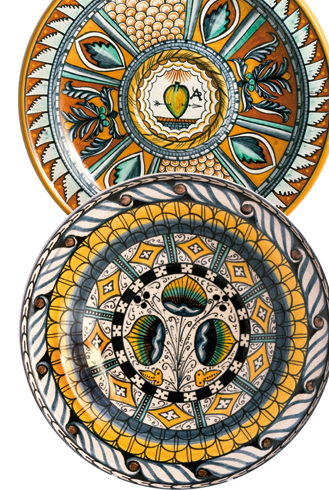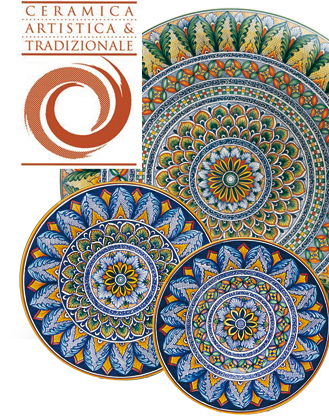

Marcella Favaroni trained in a traditional workshop in Deruta under the guide of a ceramist Master. There she could acquire a firm expertise on Deruta’s traditional fifteenth and sixteenth centuries techniques and gained a good reputation among Deruta’s decorators.
In 1978, with her husband Cipriano Bungiatella, she opens her own workshop Ceramiche Miriam where she began to create furniture, lamps, plates and many other objects for daily use aiming to bring beauty and art in everyday life.
In fact Marcella’s style is a fine revival of traditional fifteenth and sixteenth centuries decorative patterns: acanthus leaves, peacocks and arabesques are painted combing amazing and elegant colors.
Her artistic sensibility attracted the attention of a wide public. In fact in 1994, Ceramiche Miriam was the official representative of Umbria at the exhibition Italy from past to the future that took place in Bruxelles.
You can admire this plate at the Regional Ceramics Museum of Deruta. This plate was exhibited at the European Parliament in Strasbourg on the occasion of an imporant event.
In 1998 the township of Deruta asked Ceramiche Miriam to copy an albarello, that is to say a type of maiolica earthenware jar, of the seventeenth century.
Ceramiche Miriam traditional decoration is renowed as an innovative revival of the fifteenth century Severo technique. In fact Ceramiche Miriam applied two cromatic variations, green-orange and yellow - cobalt blue, on traditional objects (plates, bowls, lamps, jars) and on design object reaching a knowable decorative style.
Ceramiche Miriam decoration has a certificate of guarantee Traditional Artistic Ceramics (C.A.T.). This certificate guatantees that the item is hand-made and hand-painted by artisans that works in the traditional area of ceramics production. Moreover the certification guarantees that the artisans follow the directions of the National Ceramic Council that fixes the models, the shapes and traditional decorations of each one of the 36 Italian municipalities belonging to d.o.c.g. (controlled origin denomination) of Artistic and Traditional Ceramics.